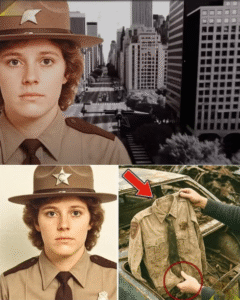Fifteen Years Later, The Truth Finally Emerges…
The house had always been quiet, but not empty. Even when the doors were locked and the windows sealed against the monsoon winds, it hummed with the weight of stories left untold. Ivy crept up its stone walls like secrets trying to escape. The garden, once manicured with obsessive care, had grown wild—flowers blooming in defiance, vines curling around rusted tools, petals falling like forgotten promises.
It had been fifteen years since anyone had dared step inside.
And now, she was back.
Mira stood at the gate, fingers grazing the iron scrollwork, her breath catching in the humid air. The house hadn’t changed, not really. It still wore its silence like a shroud. But something in her had shifted. She wasn’t the girl who had fled in the middle of the night, clutching a suitcase and a secret. She was older now. Sharper. And she had come for the truth.
Inside, dust lay thick on every surface, like time had settled in to stay. The air smelled of jasmine and mildew. Her footsteps echoed against the tiled floor, each one a drumbeat of memory. The portrait still hung in the hallway—her mother, radiant and unreadable, painted in oils that had begun to crack. Beneath it, the console table where the letters had once been kept. She opened the drawer.
Empty.
Of course.
The truth wasn’t going to be handed to her. It never had been.
She moved through the rooms like a ghost retracing its own death. The study was untouched—books still stacked in precarious towers, the typewriter still perched on the desk, ribbon long dried. She remembered the sound it made, the clack-clack of her father’s fingers as he typed late into the night. He had been writing something. A memoir, he said. Or maybe a confession.
But he died before it was finished.
Or so she’d been told.
The attic was where she found it. A box, tucked beneath a moth-eaten quilt, labeled in her father’s handwriting: For Mira. When she’s ready.
Her hands trembled as she opened it.
Inside were pages—hundreds of them. Typed, annotated, some stained with coffee, others with tears. A manuscript. The memoir. But it wasn’t about his life. It was about hers.
And her mother.
And the lie that had shaped everything.
Fifteen years ago, Mira’s mother had disappeared. The official story was simple: she had drowned. A boating accident. No body recovered. Closed case.
But Mira had never believed it. Not really. Her mother was too careful, too calculating. She didn’t vanish. She orchestrated.
And now, the pages confirmed it.
Her father had known. He had helped her escape.
The memoir detailed a plan—months in the making. Her mother had discovered something. A scandal. A betrayal. Something that would ruin powerful people. She had tried to expose it, but the threats came quickly. So she ran. With her husband’s help, she faked her death. Disappeared into a life Mira had never been allowed to know.
The final pages were letters. From her mother. To Mira.
Each one a fragment of truth.
“I wanted to take you with me. But I couldn’t risk it. You were safer believing I was gone.”
“I watched you grow from afar. I saw your first exhibition. I cried in the back row.”
“I’m sorry. For everything. But I did it to protect you.”
Mira read them all. Slowly. Reverently. Like scripture.
And then she found the last envelope.
No letter. Just an address.
A village in the north. Remote. Unremarkable.
She went.
It took two days by train, then another by bus. The roads narrowed, the landscape blurred into green and mist. At last, she arrived. A small house, tucked behind a grove of frangipani trees. A woman sat on the porch, weaving something delicate and golden.
Mira approached.
The woman looked up.
And smiled.
It was her.
Older. Softer. But unmistakably her.
They didn’t speak at first. Just stared. Let the years fill the silence.
Then her mother stood, opened her arms, and Mira stepped into them.
The truth had finally emerged.
Not with fanfare.
Not with fury.
But with forgiveness.
Epilogue
Back in the city, Mira published the memoir. Not as a scandal, but as a tribute. She called it “The Garden That Waited.” It became a sensation—not for the revelations, but for the tenderness. The way it honored complexity. The way it refused to reduce people to villains or saints.
She returned to the old house once more. This time, with her mother.
Together, they replanted the garden.
Each flower a chapter.
Each bloom a truth.
And when the ivy finally bloomed, curling around the porch in a riot of green and violet, Mira smiled.
Because some stories don’t end.
They just begin again.


